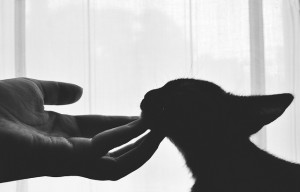The Six P’s of Touch

photo CC by SA Nelumba
You can become a touch savant by playing with the six p’s — presence, purpose, patience, precision, pattern and progression. When you do so, you get to the ultimate p -— Pleasure!
Presence
It is in the imperceptible space between that which touches and that which is touched that one body can be felt, no matter how closely, to be different from another.
When you are fully present and in the moment with your touch, it will be exquisite. paying relaxed, soft-focused attention is a great way to let your kinesthetic intelligence emerge. If you’re touching your partner’s thigh, be present to the thigh. Don’t think about where you’re hoping to get to after that. delight in the delicious now.
Use your own sexcraft skills to stay present. if you find yourself in a thinking or distracted place, slow down or better yet, get still. Get centered back into your own experience using breath, awareness, intention (or whatever your favorite centering tools are.) Then shift your awareness back to your partner.
Purpose
Touch transmits intention. If someone is rubbing your back as a prelude to getting into your pants, you’ll know it. If someone is intending to give you pleasure, their touch will transmit that, too.
I encourage you to create conscious intentions when you connect erotically with yourself and others. Focus on connection, pleasure and co-creating a great improvisational journey, not on getting or achieving.
Patience
When I’m asked for one single bit of advice about how to have better sex, my answer is this -— take your time. Quickies can be fun snacks, but extraordinary sex usually occurs when you slow down to enjoy the feast.
While I certainly recommend taking time to have leisurely encounters, I mean something else as well. Don’t be in a hurry to get from point A to point B. Dogs (or should i say, core-yang people), this means not diving directly into your pussycat’s nether regions. If you want to do some muff munching, consider starting at her toes, taking time with every digit, then traveling oh-so-slowly up her leg until she’s desperate to have you dive into her glorious genitalia. Slow is good -— it creates anticipation and builds arousal. The more patient you are, the hungrier your kitty will be and the more you’ll be rewarded when you feed her (or feed on her).
Precision
By precision, I mean touch that’s discerning, accurate and exquisitely focused. it’s one of the keys to touching masterfully instead of just “okay-fully.”
It requires you to toggle your attention and awareness fluidly back and forth between yourself and your partner. as we get more turned on, it’s easy to lose our focus and get wild and sloppy with our movements. as things up-regulate and your brain heads down toward the basement, do your best to pay extra attention to the importance of precision!
It also requires presence —- you can’t be precise without being present.
Pattern
If you touch someone in the same way over and over again, it can get monotonous or irritating. if you deviate non-stop, it can feel incoherent and chaotic and keep the recipient from going into trance. There’s a middle ground between chaotic and boring. Masterful touch is like music -— it creates patterns with its combination of rhythm, repetition, harmony and syncopation. Repeating a move creates space for appreciation and feeds anticipation. It creates a pleasing expectation -— a sort of touch security, as it were —- and escalates entrancement.
Syncopation offers an accent note. It delivers the element of surprise, and it does so without taking the recipient out of the zone. Use motion and stillness, just as music works with sound and silence. Remember: stillness is a ‘move’ just like motion is a move. Play with a beat, melody and cadence. Use repetition, surprise, rhythm, syncopation, tempos and motifs to create your very own symphony of touch.
You can also play with touch as if it were visual art. Pretend you’re finger-painting, sculpting, outlining or shading. Here, too, use designs, motifs, recurring themes, and gradually changing patterns. Doodle with their body! There’s a larger takeaway here: touch is an art form—and mastery equals artistry.
Progression
Pattern and progression are closely related. in fact, progression is how you get from pattern a to pattern B, or from location a to location B, without having it feel rushed, jumpy or chaotic. Let your touch have internal consistency, a sort of touch logic. Don’t jump around randomly from one place on the body to another. Play with progressing coherently from place to place, or from one layer to another. Shift fluently between languages. Transition gradually between tempos or from broad strokes to detailed ones.
Generally, use smooth, gradual transitions (except when you want to delight with the surprise of an accent note). For instance, going from deeply therapeutic shoulder massage directly to genital stimulation might be disconcerting. However, if you move from deep kneading of the big back muscles down to the buttocks, shift to a lighter sensual rhythmic stroke down the thigh, followed with a teasing, feathery flit up the inner thigh, a quick brush past the crotch, to almost touching the genitals, and finally to landing there with a deliberate firm hand — well, that can be utterly delicious.
During all of this, of course, you’ll want to practice another of the ‘p’s —- patience. There’s an art to finding the balance between taking your time and being too slow. Here, look for the receiver to give cues. as long as they’re loving it, linger there. When they’re not responding positively, it may be time to move on to something else.
Receivers, there’s a message in this for you: Be actively responsive. Not only will this amplify your pleasure, you’ll be letting your giver know how you love to be touched. And that’s a positive pleasure circuit!

